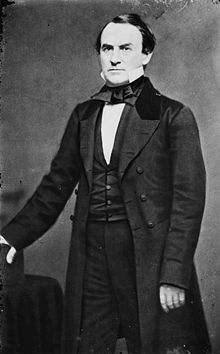Charles J. Faulkner
Charles James Faulkner (born July 6, 1806 in Martinsburg , Virginia , † November 1, 1884 there ) was an American politician . Between 1851 and 1853 he represented the tenth and from 1853 to 1859 the eighth constituency of the state of Virginia in the US House of Representatives . From 1875 to 1877 he was there the representative of the second electoral district of West Virginia . He also served as US ambassador to France from 1859 to 1861 .
Career
Charles Faulkner was born in 1806 in Martinsburg, which was then still part of Virginia, but has belonged to the new state since West Virginia was founded in 1863. Until 1822 he studied at Georgetown University in Washington . After studying law and being admitted to the bar in 1829, he began to work in his new profession. From 1829 to 1834 and from 1848 to 1849 he was a member of the Virginia House of Representatives .
Faulkner initially became a member of the Whig Party . Between 1838 and 1842 he was a member of the Virginia Senate . Faulkner was also on a commission that settled the disputed border issues between the states of Virginia and Maryland . In 1850 he was elected to the House of Representatives in Washington as a Whig candidate in the tenth district of Virginia. There he took up his new mandate on March 4, 1851. During this legislative period, Faulkner switched to the Democratic Party . For this he was elected to Congress in the eighth district of Virginia in 1852 , where he replaced Alexander Holladay on March 4, 1853 . After two re-elections in 1854 and 1856, he could remain in Congress until March 3, 1859. There he was from 1857 chairman of the committee for military affairs. This period was overshadowed by the heated discussions about slavery and the contrast between the northern and southern states .
After the end of his time in Congress, Charles Faulkner was appointed ambassador to France by US President James Buchanan . He held this office until August 1861. In the meantime the civil war had begun in America . After his return he was immediately arrested for negotiating arms sales to the Confederate States in Paris . He was later exchanged for Congressman Alfred Ely from New York State , who had become a Confederate prisoner of war, and deported to the southern states. Faulkner became a member of the Confederate Army and served there on the staff of General Thomas "Stonewall" Jackson .
After the war he settled in the newly founded state of West Virginia in 1863, which also included his hometown Martinsburg. During this time Faulkner also got into the railroad business. In 1872 he was a member of a commission to revise the West Virginia Constitution. In 1874 he was elected to Congress in Washington in the second district of West Virginia, where he replaced the Republican John Hagans on March 4, 1875 . Until March 3, 1877, however, he only completed one legislative period there.
After his time in Congress finally ended, Faulkner returned to work as a lawyer. He died in 1884 on his family estate "Boydville" near Martinsburg. There he found his final resting place. Charles Faulkner was married to Mary Wagner Boyd. His son Charles (1847-1929) represented the state of West Virginia in the US Senate between 1887 and 1899 .
Web links
- Charles J. Faulkner in the Biographical Directory of the United States Congress (English)
- Charles J. Faulkner in the database of Find a Grave (English)
| personal data | |
|---|---|
| SURNAME | Faulkner, Charles J. |
| ALTERNATIVE NAMES | Faulkner, Charles James |
| BRIEF DESCRIPTION | American politician |
| DATE OF BIRTH | July 6, 1806 |
| PLACE OF BIRTH | Martinsburg , Virginia |
| DATE OF DEATH | November 1, 1884 |
| Place of death | Martinsburg , West Virginia |


